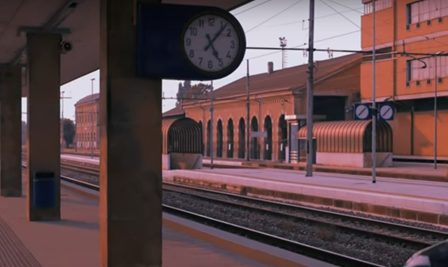750 Hours on a Train

Living in northern Italy in the late 1970s I would take a commuter train every morning, at 5 or 6 AM, and ride just under two hours from Treviso to Vicenza, where I was attending high school. I was 16 or 17 years old at the time.
Each morning, painfully early, I would walk about 15 minutes to the station. I know it must have been warm, at least occasionally, but what I recall is a damp and penetrating cold. The Veneto region of Italy tends to be quite cold and is fog bound in the winter; it wasn’t unusual to go for weeks without seeing the sun. The fog was thick and stationary, never moving. The only movement was made by people or things, emerging or disappearing into the soft gray damp.
If I was too early for the train, I would go into the 2nd class waiting room. This area was large, high ceilinged, with marble floors. The hard surfaces amplified every sound, every footstep, every creaking seat. Despite the amplification, or perhaps because of it, the train announcements over the PA would echo, reverberate and be completely unintelligible.
The benches were made of wood, mostly worn smooth from use over the years. Despite the smoothness, the surfaces were slightly sticky, perhaps an effect of the damp, of people’s hands, or of the smoky residue from the trains. In any case, when you touched the benches and removed your hand, your skin would stick just an instant, just long enough to feel unclean.
But more often I leapt up onto the platform just prior to the arrival of the train. Although the train had many cars, it was always packed. Treviso was not the first stop, and there were already people on board. The platform was filled with people, mostly working men commuting to job sites. It was a fairly rough crowd.
When the doors opened, there was a crush to climb aboard and snag whatever seats were available. Inevitably the cars would fill with people standing, so in the beginning, I found myself standing for almost two hours.
I was an oddity on that train. I was a teenager, blonde, rather pretty and dressed a touch inappropriately for the situation. As such, I attracted a fair amount of attention from the rough and tumble blue collar commuters. Once they realized that I too was a regular, they began to save a spot for me. The bigger and beefier men would shove themselves aboard and immediately commandeer a four-seat section. The railway cars had seats grouped by four, with two seats each facing each other. They would save me a seat and so I learned how to play “scopa”.
Scopa is an old Italian card game, played with a deck that looks like a pack of tarot cards. I don’t recall the game play anymore, but I do remember the loud and cheery cries of “settebello” (beautiful seven), which signaled a high number of points in the game. The games were played on a makeshift surface balanced on all four players’ knees. The cards were slammed down, with grunts and exclamations, peppered with curses (immediately followed by “scusa signorina” to me) and generally rowdy talk. There could be no better way to start the day.
I think I must have been an odd feature of that morning train ride. Picture a petite blonde with an accent, playing cards and yelling alongside these burly workers. There I was, incongruous and completely happy.
Some mornings everyone was tired, and the scopa game did not get underway. The hypnotic rhythm of the train wheels, the rocking of the car, the cigarette smoke, and the faint metallic oily taste that never left your mouth would create a dozy state of mind and body. Then I would lean onto some massive shoulder and sleep until our destination.
I was completely safe, completely protected by this group of about a dozen workers. It was as though I were their pet, like a frisky cute little mongrel dog.
One of the men was different than the others. He was an officer in the Italian military, and wore his blue uniform and military hat on every trip. He was neat and trim, and he did not play cards. He would watch and comment about the play, but was always more subdued than the others.
I don’t remember his name. He was likely in his 30s or 40s, but it was very hard to tell because his entire face was burned. He had no nose, just two holes where his nostrils would have been. He only had a round opening for a mouth and it left most of his teeth exposed. He rarely removed his hat, but when he did you could see that he had no hair and no ears — again just holes on the side of his head, leading to an eardrum somewhere inside. There were no eyebrows and only rudimentary remnants of eyelids. Generally he wore large dark sunglasses, so this I only discovered later. He always wore very stiff black gloves, and one time he removed them, revealing tiny stumps of fingers. The glove’s fingers were stuffed with some type of stiff material, and those stumps allowed him to move the glove fingers as one would use a hand somewhat normally. His arms, which I saw only once, had only the shiny taut skin of a burn victim. He proudly showed me pictures of his two small children and wife. I wondered if the children were born before or after the accident.
I never learned exactly what had happened, other than it happened at work. He had been around something flammable and got the worst of it. He never provided details and I never asked.
Sometimes, if I wasn’t playing cards or sleeping on some giant’s shoulder, I would be reading some trashy pocketbook. One day I had found a copy of “The Happy Hooker”, a moderately risqué pseudo-biography of a successful call girl, that offered cheerful and explicit advice on how to please a man.
The burned man could read and speak a little English, and he was fascinated by this book, looking forward to reading it when I tired of it. I recall he asked me what was meant by the term “doggie style” and I felt somehow horribly embarrassed. I could not find it within me to explain. Something about his body being burned from head to toe made me deeply uncomfortable in this context. Remember, I was 16 or 17 years old at the time, thinking I was wise and worldly, but in reality still such a child.
The return trip was longer, not being an express trail and stopping in every little hamlet. There were not so many regulars; only a few took the same train with me in the afternoon as in the morning.
I had a longer time in the Vicenza waiting room, another dismal second class affair, but smaller and more sparsely populated. It too was an unpleasant space, and very dark. Even though it was late afternoon, it was usually quite dark outside because of the fog. The metallic tang of the trains and the greasy feel of the seats, combined with the poor lighting, would make me brave the periphery of the station rather than stay indoors. The waiting room usually felt colder and damper than the outside.
One late afternoon, I was pacing around a grassy area outside the station, when I spotted a morning regular (not one of my buddies — just a familiar face) rustling around in the bushes. He signaled to me to approach, and then opened up his long overcoat and, well, started masturbating. Suddenly the waiting room seemed a so much nicer a place.
I boarded the train home that evening and got on a different car than the man from the bushes. A couple of my regular friends followed me, and saw that something was amiss. After some insistent queries, I told them what had happened. They told me rather nonchalantly that everything would be fine and that I had nothing to worry about.
I thought they were trivializing the events, and I regretted even discussing it with them.
The next morning, and every morning afterward, the man of the bushes did not appear at the train station. He was also never on the afternoon train. I asked my friends what had happened. Had they said something? Done something? Each of them looked at me blankly and said they had no idea.
I rode those trains for nine months, 5 days a week, 4 hours each day. This is roughly 750 hours, or almost a total of 31 days. I spent about a complete month with these burly men, and then school ended. I never saw any of them again, nor do I remember their names. And yet, we had a relationship that was as real as any other, and in some ways, perhaps more meaningful than most. At the time I had no idea how these 750 hours would become so ingrained in memory.
Would you like to read other posts? If so, please click the Home Page link below:

You, Dear Reader, are much needed and appreciated.
Everything written requires a reader to make it whole. The writer begins, then you, dear reader, take in the idea and its image, and so become the continuation of its breath. Please subscribe so that my words can breathe. Consider this my hand, reaching out to yours.
